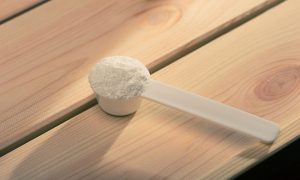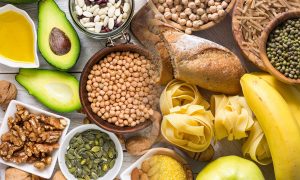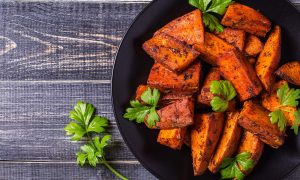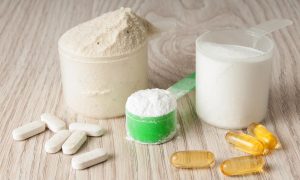Is It Important To Have Carbs Post-Workout?

|
|
When it comes to working out and getting in shape, people with no real experience in the matter tend to think that training and exercising in the gym is the hardest part of the entire process, when in actual fact it’s the diet and nutritional aspect of things that many people struggle with. Utilising the correct nutrients to help us get ourselves into the best shape possible is an art and it is something that many of us struggle with, and rightly so. Not only do we need to consume the right foods and the right nutrients, but we also need to consume the right foods and the right nutrients at the right time. Just to complicate matters further, it’s also vital that we know which foods and nutrients work most effectively with each other, and which ones can be detrimental to the other. For example, for fat loss, consuming healthy fats and carbohydrates together is considered detrimental, whereas consuming protein and healthy fats together is beneficial. Carbohydrates have sparked many a heated debate over the last decade or so, as some people swear by them, and others say they’re simply not needed. From a post-workout perspective however, there is strong evidence to suggest that carbohydrates are not only ok, but that they’re actually essential if you want to maximise the results you’re able to achieve. Here we’ll be taking a more in-depth look at what carbohydrates are, and whether or not it is indeed important to consume carbs post-workout.
What are carbohydrates?

Carbohydrates are one of three essential macronutrients, the other two being fat and protein, and play a key role in a number of various processes within the human body. They help with the maintenance of day to day life, and contribute towards a number of key internal functions as well, including the production of energy. People tend to have a love-hate relationship with carbs, with some people singing their praises due to their ability to nourish our bodies with quick energy levels, and others blaming them for their ever-expanding waistlines. Thanks to a certain Dr Atkins, low-carb diets were considered all the rage for a number of years, and they did indeed help to dramatically reduce body fat levels in people all over the world. However, health and medical experts pointed out a number of dangers associated with low-carb diets and recommended that we still consume our recommended daily intake of calories per day, in order to benefit from optimal health and fitness levels. Carbohydrates are sugars with their basic molecular structure being made up of hydrogen, oxygen, and carbon, containing roughly around twice as much hydrogen compared with carbon and oxygen. Carbohydrates however, can be found in simple and complex forms, with the complex forms being considered the healthiest options. Complex carbohydrates are found in foods including:
• Potatoes
• Sweet potatoes
• Brown rice
• Pasta
• Wholemeal bread
• Cereals
• Starchy vegetables and legumes
Simple carbohydrates however, are found in foods rich in sugar, so: candy, fruit juice, white bread, white rice to some degree, and even fruit itself due to the natural fructose sugars.
Why do we need carbohydrates?
Carbohydrates have been found to be highly beneficial from a post-workout standpoint, but before we cover that, first off we’ll take a look at a few reasons why we need carbohydrates in our bodies in general. To begin with, carbohydrates help to provide energy and can improve athletic performance. When we consume carbs, the body sees them as a preferred source of energy and then breaks them down, converts them into glucose sugar, and uses that as a primary source of energy. This is why athletes tend to consume a lot of carbs before a race, or the night before endurance events to flood their muscles with glycogen. As well as this however, carbohydrates also help to protect other nutrients, including protein, which is vital for muscle growth and repair. Without carbs, our bodies would utilize proteins for energy instead, meaning that when it came to building and repairing muscle tissue, there would be no protein, so the muscles would not be able to grow. But enough of that, now we’ll look at carbohydrates post-workout.
Do we need carbohydrates post-workout?

In a few words, yes we do. Carbohydrates are arguably more essential immediately following a workout than at any other point in the day, for a number of different reasons. The main reason is to help replenish glycogen stores that will have been depleted during your workout. As you exercise, lifting weights for example, glycogen is your primary fuel source of the muscles. Glycogen is basically stored glucose as it is comprised of various glucose molecules with a number of different branches. Glycogen is essential for ATP production (Adenosine Tri Phosphate) which is vital for muscle contractions and repair. Glycogen is essential for post-workout muscle recovery because it is the primary fuel source of the muscles. As the fuel reserves will be empty following a workout, refilling them as quickly as possible is extremely beneficial. To begin with, not only does this help with protein synthesis, but it can also assist with cell volumization as glycogen pulls water into the cells in the muscles, increasing their volume and their fullness.
How about the Insulin spike?
As well as that, another key benefit of carbs immediately following a workout is the fact that they can lead to a spike in insulin levels. Insulin is a hormone designed to help regulate blood sugar levels. One of the main reasons why it’s beneficial immediately following a workout is that it helps to shuttle nutrients into the cells within the muscles, because due to their depleted glycogen levels, as they’re near completely empty, they’re anabolically primed for maximum nutrient absorption. This is known as the anabolic window and it only lasts around one hour after a workout, as afterwards the cells simply can’t absorb as many nutrients. By spiking insulin we’re able to shuttle more nutrients into the muscles, and with the right combination I.E oxygen, water, protein, and amino acids, the body can quickly initiate protein synthesis and begin regenerating new muscle proteins. To create an insulin spike however, we require simple carb sources such as dextrose sugar, candy, fruit juice, or natural fruit. Many bodybuilders will add dextrose to their post-workout protein shakes to spike insulin and force as much nutrients into their muscles as possible.














